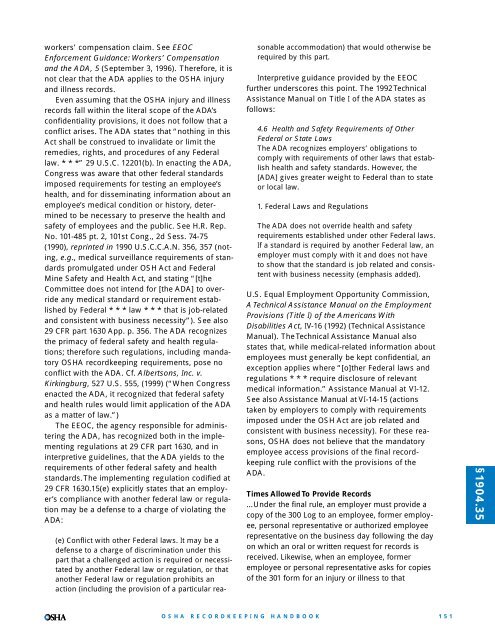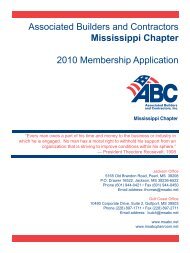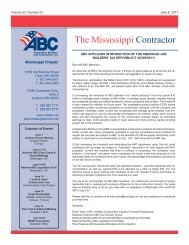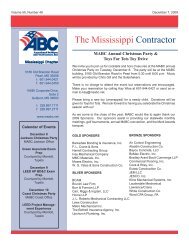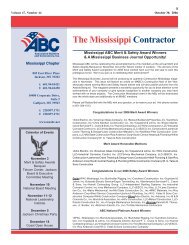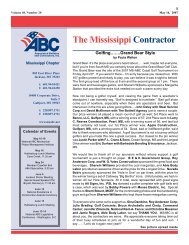§1904.35tions on employees’ and employee representatives’use of the injury and illness information.There is also a concern that employers may voluntarilygrant access to <strong>OSHA</strong> records to personsoutside their organization, who do not need theinformation for safety and health purposes. To protectemployee confidentiality in these circumstances,paragraph 1904.29(b)(10) requires employersgenerally to remove or shield employee namesand other personally identifying information whenthey disclose the <strong>OSHA</strong> forms to persons otherthan government representatives, employees, formeremployees or authorized employee representatives.Employers remain free to disclose unredactedrecords for purposes of evaluating a safety andhealth program or safety and health conditions atthe workplace, processing a claim for workers’compensation or insurance benefits, or carrying outthe public health or law enforcement functionsdescribed in section 164.512 of the final rule onStandards for Privacy of Individually IdentifiableHealth Information.<strong>OSHA</strong> believes that this provision protects employeeprivacy to a reasonable degree consistentwith the legitimate business needs of employersand sound public policy considerations....Misuse of the Records by Employees andTheir Representatives...While there may be instances where employeesshare the data with third parties who normallywould not be allowed to access the data directly,the final rule contains no enforceable restrictionson use by employees or their representatives.Employees and their representatives might reasonablyfear that they could be found personally liablefor violations of such restrictions. This would havea chilling effect on employees’ willingness to usethe records for safety and health purposes, sincefew employees would voluntarily risk such liability.Moreover, despite the concerns of commentersabout abuse problems, <strong>OSHA</strong> has not noted anysignificant problems of this type in the past. Thissuggests that, if such problems exist, they are infrequent.In addition, as noted in the privacy discussionabove, a prohibition on the use of the data byemployees or their representatives is beyond thescope of <strong>OSHA</strong>’s enforcement authority. For thesereasons, the employer may not require an employee,former employee or designated employee representativeto agree to limit the use of the recordsas a condition for viewing or obtaining copies ofrecords.<strong>OSHA</strong> has added a statement to the Log andIncident Report forms indicating that these recordscontain information related to employee health andmust be used in a manner that protects the confidentialityof employees to the extent possible whilethe information is used for occupational safety andhealth purposes. This statement is intended toinform employees and their representatives of thepotentially sensitive nature of the information inthe <strong>OSHA</strong> records and to encourage them to maintainemployee confidentiality if compatible withthe safety and health uses of the information.Encouraging parties with access to the forms tokeep the information confidential where possible isreasonable and should not discourage the use ofthe information for safety and health purposes.<strong>OSHA</strong> stresses, however, that the statement doesnot reflect a regulatory requirement limiting theuse of records by those with access under sections1904.35 and 1904.40.The Records Access Requirement and the ADA...Section 12112(d)(3)(B) of the ADA permits anemployer to require a job applicant to submit to amedical examination after an offer of employmenthas been made but before commencement of employmentduties, provided that medical informationobtained from the examination is kept in a confidentialmedical file and not disclosed except asnecessary to inform supervisors, first aid and safetypersonnel, and government officials investigatingcompliance with the ADA. Section 12112(d)(4)(C)requires that the same confidentiality protection beaccorded health information obtained from a voluntarymedical examination that is part of an employeehealth program.By its terms, the ADA requires confidentiality forinformation obtained from medical examinationsgiven to prospective employees, and from medicalexaminations given as part of a voluntary employeehealth program. The <strong>OSHA</strong> injury and illnessrecords are not derived from pre-employment orvoluntary health programs. The information in the<strong>OSHA</strong> injury and illness records is similar to thatfound in workers’ compensation forms, and maybe obtained by employers by the same processused to record needed information for workers’compensation and insurance purposes. The EqualEmployment Opportunity Commission (EEOC) recognizesa partial exception to the ADA’s strict confidentialityrequirements for medical informationregarding an employee’s occupational injury or150<strong>OSHA</strong> RECORDKEEPINGHANDBOOK
workers’ compensation claim. See EEOCEnforcement Guidance: Workers’ Compensationand the ADA, 5 (September 3, 1996). Therefore, it isnot clear that the ADA applies to the <strong>OSHA</strong> injuryand illness records.Even assuming that the <strong>OSHA</strong> injury and illnessrecords fall within the literal scope of the ADA’sconfidentiality provisions, it does not follow that aconflict arises. The ADA states that “nothing in thisAct shall be construed to invalidate or limit theremedies, rights, and procedures of any Federallaw. * * *” 29 U.S.C. 12201(b). In enacting the ADA,Congress was aware that other federal standardsimposed requirements for testing an employee’shealth, and for disseminating information about anemployee’s medical condition or history, determinedto be necessary to preserve the health andsafety of employees and the public. See H.R. Rep.No. 101-485 pt. 2, 101st Cong., 2d Sess. 74-75(1990), reprinted in 1990 U.S.C.C.A.N. 356, 357 (noting,e.g., medical surveillance requirements of standardspromulgated under OSH Act and FederalMine Safety and Health Act, and stating “[t]heCommittee does not intend for [the ADA] to overrideany medical standard or requirement establishedby Federal * * * law * * * that is job-relatedand consistent with business necessity”). See also29 CFR part 1630 App. p. 356. The ADA recognizesthe primacy of federal safety and health regulations;therefore such regulations, including mandatory<strong>OSHA</strong> recordkeeping requirements, pose noconflict with the ADA. Cf. Albertsons, Inc. v.Kirkingburg, 527 U.S. 555, (1999) (“When Congressenacted the ADA, it recognized that federal safetyand health rules would limit application of the ADAas a matter of law.”)The EEOC, the agency responsible for administeringthe ADA, has recognized both in the implementingregulations at 29 CFR part 1630, and ininterpretive guidelines, that the ADA yields to therequirements of other federal safety and healthstandards. The implementing regulation codified at29 CFR 1630.15(e) explicitly states that an employer’scompliance with another federal law or regulationmay be a defense to a charge of violating theADA:(e) Conflict with other Federal laws. It may be adefense to a charge of discrimination under thispart that a challenged action is required or necessitatedby another Federal law or regulation, or thatanother Federal law or regulation prohibits anaction (including the provision of a particular reasonableaccommodation) that would otherwise berequired by this part.Interpretive guidance provided by the EEOCfurther underscores this point. The 1992 TechnicalAssistance Manual on Title I of the ADA states asfollows:4.6 Health and Safety Requirements of OtherFederal or State LawsThe ADA recognizes employers’ obligations tocomply with requirements of other laws that establishhealth and safety standards. However, the[ADA] gives greater weight to Federal than to stateor local law.1. Federal Laws and RegulationsThe ADA does not override health and safetyrequirements established under other Federal laws.If a standard is required by another Federal law, anemployer must comply with it and does not haveto show that the standard is job related and consistentwith business necessity (emphasis added).U.S. Equal Employment Opportunity Commission,A Technical Assistance Manual on the EmploymentProvisions (Title I) of the Americans WithDisabilities Act, IV-16 (1992) (Technical AssistanceManual). The Technical Assistance Manual alsostates that, while medical-related information aboutemployees must generally be kept confidential, anexception applies where “[o]ther Federal laws andregulations * * * require disclosure of relevantmedical information.” Assistance Manual at VI-12.See also Assistance Manual at VI-14-15 (actionstaken by employers to comply with requirementsimposed under the OSH Act are job related andconsistent with business necessity). For these reasons,<strong>OSHA</strong> does not believe that the mandatoryemployee access provisions of the final recordkeepingrule conflict with the provisions of theADA.Times Allowed To Provide Records...Under the final rule, an employer must provide acopy of the 300 Log to an employee, former employee,personal representative or authorized employeerepresentative on the business day following the dayon which an oral or written request for records isreceived. Likewise, when an employee, formeremployee or personal representative asks for copiesof the 301 form for an injury or illness to that§1904.35<strong>OSHA</strong> RECORDKEEPINGHANDBOOK151
- Page 1 and 2:
www.osha.govOSHARecordkeepingHandbo
- Page 3 and 4:
OSHARecordkeeping HandbookThe Regul
- Page 5 and 6:
ContentsRecordkeeping HandbookRoadm
- Page 7 and 8:
Section 1904.40Providing records to
- Page 9 and 10:
Section 1904.0Purpose(66 FR 6122, J
- Page 11 and 12:
Section 1904.1Partial exemption for
- Page 13 and 14:
Section 1904.2Partial exemption for
- Page 15 and 16:
employees, to OSHA within 8 hours (
- Page 17 and 18:
Partial Exemptions for Employers Un
- Page 19 and 20:
Section 1904.4Recording criteria(66
- Page 21 and 22:
Section 1904.5Determination of work
- Page 23 and 24:
(b)(7) How do I decide if a case is
- Page 25 and 26:
well, including providing informati
- Page 27 and 28:
This exception, which responds to i
- Page 29 and 30:
or she is in the work environment a
- Page 31 and 32:
have occurred but for the occupatio
- Page 33 and 34:
considered work-related. If an empl
- Page 35 and 36:
Question 5-12. Is work-related stre
- Page 37 and 38:
• The doctor described the illnes
- Page 39 and 40:
Scenario 7:• A site hired numerou
- Page 41 and 42:
Letter of interpretation related to
- Page 43 and 44:
These principles should be applied
- Page 45 and 46:
The problem with the response is tw
- Page 47 and 48:
Section 1904.6Determination of new
- Page 49 and 50:
the Guidelines stated that “the a
- Page 51 and 52:
estricted work. If the case is a pr
- Page 53 and 54:
• The doctor also prescribed the
- Page 55 and 56:
• The employees were under the di
- Page 57 and 58:
Section 1904.7General recording cri
- Page 59 and 60:
(iii) Do I have to record restricte
- Page 61 and 62:
of the length of time the employee
- Page 63 and 64:
then result in days away from work
- Page 65 and 66:
A partial day of work is recorded a
- Page 67 and 68:
In all other respects, the final ru
- Page 69 and 70:
ments. The Agency believes that the
- Page 71 and 72:
e recorded because it will require
- Page 73 and 74:
However, episodes of fainting from
- Page 75 and 76:
care professional, he or she may al
- Page 77 and 78:
“Other simple means” of removin
- Page 79 and 80:
For purposes of OSHA recordkeeping
- Page 81 and 82:
• When answering the doctor’s q
- Page 83 and 84:
Response: In the recordkeeping regu
- Page 85 and 86:
Letter of interpretation related to
- Page 87 and 88:
Section 1904.8Recording criteria fo
- Page 89 and 90:
caused by contaminated needles and
- Page 91 and 92:
Section 1904.9Recording criteria fo
- Page 93 and 94:
Section 1904.10Recording criteria f
- Page 95 and 96:
hearing loss case that is not relat
- Page 97 and 98:
average of 10 decibels or more at 2
- Page 99 and 100:
argued that because the function of
- Page 101 and 102:
occurs, and where hearing loss can
- Page 103 and 104:
cases in their workplace via analys
- Page 105 and 106:
March 4, 2004Mr. Carl O. Sall, CIHD
- Page 107 and 108: When the professional evaluating th
- Page 109 and 110: (2) May I line-out or erase a recor
- Page 111 and 112: Section 1904.12Recording criteria f
- Page 113 and 114: These new statistics would add only
- Page 115 and 116: Sections 1904.13 - 1904.28 Reserved
- Page 117 and 118: two lines of the OSHA 300 Log to de
- Page 119 and 120: which replace the OSHA 200 and 101
- Page 121 and 122: different types of occupational ill
- Page 123 and 124: OSHA 301 form. These data are usefu
- Page 125 and 126: LETTERS OF INTERPRETATION: Section
- Page 127 and 128: Question 2: Under 29 CFR Section 19
- Page 129 and 130: and has adopted language in the fin
- Page 131 and 132: Section 1904.31Covered employees(66
- Page 133 and 134: label assigned to a worker is immat
- Page 135 and 136: These workers should be evaluated j
- Page 137 and 138: Response: A case is work-related if
- Page 139 and 140: Response: Section 1904.31 states th
- Page 141 and 142: Thank you for your interest in occu
- Page 143 and 144: year covered by the summary. The su
- Page 145 and 146: 2. Number of employees and hours wo
- Page 147 and 148: LETTERS OF INTERPRETATION: Section
- Page 149 and 150: Section 1904.33Retention and updati
- Page 151 and 152: June 23, 2003Mr. Edwin G. Foulke, J
- Page 153 and 154: Section 1904.34Change in business o
- Page 155 and 156: PREAMBLE DISCUSSION: Section 1904.3
- Page 157: Incident Report (Forms 300 and 301,
- Page 161 and 162: LETTERS OF INTERPRETATION: Section
- Page 163 and 164: Letter of interpretation related to
- Page 165 and 166: Question 3: Using the facts in Ques
- Page 167 and 168: Section 1904.37State recordkeeping
- Page 169 and 170: tion, require employers to report f
- Page 171 and 172: (5) If I receive a variance, may th
- Page 173 and 174: Section 1904.39Reporting fatalities
- Page 175 and 176: gation. Therefore, the final rule d
- Page 177 and 178: Section 1904.40Providing records to
- Page 179 and 180: ness. The government inspector may
- Page 181 and 182: Response: The controlling employer
- Page 183 and 184: FREQUENTLY ASKED QUESTIONS: Section
- Page 185 and 186: OSHA and the BLS have worked togeth
- Page 187 and 188: provide copies of the retained reco
- Page 189 and 190: FREQUENTLY ASKED QUESTIONS: Section
- Page 191 and 192: Section 1904.46Definitions(66 FR 61
- Page 193 and 194: of business information. For exampl
- Page 195 and 196: inconvenience associated with keepi
- Page 197 and 198: skin disease, respiratory disorder,
- Page 199 and 200: Question 2: Under 29 CFR Section 19
- Page 201: www.osha.gov


